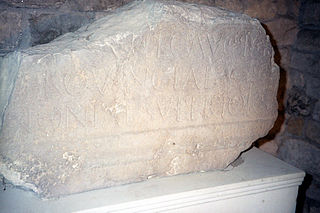Related Research Articles
Claudius Maximus was a Roman politician, a Stoic philosopher and a teacher of Marcus Aurelius. No works by him are known to exist; however, he is mentioned in a few prestigious works from classical literature.
Titus Pomponius Proculus Vitrasius Pollio was a Roman senator, who held several imperial appointments during the reign of Marcus Aurelius. He was suffect consul in an undetermined nundinium around 151; he was a consul ordinarius in the year 176 with Marcus Flavius Aper as his colleague.
Publius Mummius Sisenna Rutilianus was a Roman senator of the second century AD. He is best known from Lucian's vivid portrayal of him in Alexander vel Pseudomantis, where the senator is described as "a man of good family and tested in many Roman offices, but utterly sick as far as the gods were concerned," as the most distinguished victim of the bogus oracle established by the story's namesake in Paphlagonia. Rutilianus was suffect consul in the nundinium of May-June 146 with Titus Prifernius Paetus Rosianus Geminus as his colleague.
Gaius Curtius Justus was a Roman senator who held several posts in the emperor's service during the Antonine dynasty. He was suffect consul in 151 with Publius Julius Nauto as his colleague. Justus is known primarily through surviving inscriptions, although he could be identical with the Curtius Justus mentioned as a scriptor rei rusticae by Gargilius Martialis (2.1.4,7).
Lucius Dasumius Tullius Tuscus was a Roman senator who was an amici or trusted advisor of the emperors Antoninus Pius and Marcus Aurelius. He was suffect consul in the nundinium of April to June 152 as the colleague of Publius Sufenas.
Lucius Novius Crispinus Martialis Saturninus was a Roman senator of the second century. He was suffect consul in either 150 or 151 AD. His life is primarily known from inscriptions.
Titus Flavius Longinus Quintus Marcius Turbo was a Roman senator who held a series of offices in the emperor's service. He was suffect consul for one of the nundinia in the years 149 through 151. Longinus is known primarily from inscriptions.
Gaius Arrius Antoninus was a Roman senator and jurist active in the last half of the second century AD, who held a number of offices in the emperor's service. The date when he was suffect consul is not attested, but has been estimated to be around AD 173. Edward Champlin includes him, along with Gaius Aufidius Victorinus and Tiberius Claudius Julianus, as "marked out as a special intimate of Fronto's." Champlin notes that while Victorinus received five of the surviving letters of the rhetor Fronto, "as the beloved pupil and son-in-law", Antoninus received four, taking "the place of Fronto's son."
Quintus Camurius Numisius Junior was a Roman senator active during the later second century AD. He was suffect consul for a nundinium in the first half of the year 161 as the colleague of Marcus Annius Libo.
Gaius Fabius Agrippinus was a Roman senator active in the mid-second century AD, who held a number of offices in the emperor's service. Agrippinus served as suffect consul for the nundinium October-December 148 with Marcus Antonius Zeno as his colleague. A remarkable commonality between Agrippinus and his colleague Zeno is that they were also consecutive governors of Thracia: Géza Alföldy dates Zeno's tenure from around the year 140 to about 143, and Agrippinus' from 143 to about 146.

Marcus Iallius or Jallius Bassus was a Roman senator, general, and literary figure who held several offices in the imperial service during the mid-second century AD. He was suffect consul around the year 159. Bassus is known primarily from inscriptions. His full name was Marcus Iallius Bassus Fabius Valerianus.
Gaius Javolenus Calvinus was a Roman senator of the 2nd century AD who occupied a number of offices in the imperial service, as well as serving as suffect consul between 140 and 143.
Lucius Neratius Proculus was a Roman senator, who held several posts in the emperor's service. He was suffect consul in either the year 144 or 145. Proculus is known primarily from inscriptions.
Quintus Licinius Modestinus [? Sextus] Attius Labeo was a Roman senator, who held a number of imperial appointments during the middle of the second century AD. He was suffect consul in the year 146, following the death of Sextus Erucius Clarus in March, serving until the end of June; his colleague was Gnaeus Claudius Severus Arabianus. He is known entirely from inscriptions.
Quintus Voconius Saxa Fidus was a Roman senator, who was active during middle of the second century. He was suffect consul in the nundinium September-October 146 with Gaius Annianus Verus as his colleague. He is known almost entirely from inscriptions; Voconius is mentioned once in Ulpian's Libro octavo de officio proconsulis.

Titus Caesernius Statianus was a Roman senator who held a number of appointments in the Imperial service during the reigns of Hadrian and Antoninus Pius. He was suffect consul in the nundinium of September-October 141; his colleague's name is not known. His full name is Titus Caesernius Statius Quinctius Statianus Memmius Macrinus.
Titus Caesernius Quinctianus was a Roman senator who held a number of appointments in the Imperial service during the reigns of Hadrian and Antoninus Pius. He was suffect consul in an undetermined nundinium around the year 138. His full name was Titus Caesernius Statius Quinctius Macedo Quinctianus.
Quintus Caecilius Marcellus Dentilianus was a Roman senator, who held several imperial appointments during the reign of Antoninus Pius. He was suffect consul in an undetermined nundinium around AD 150. He is known entirely from inscriptions.
Publius Cluvius Maximus Paullinus was a Roman senator, who held a number of imperial appointments during the reigns of Hadrian and Antoninus Pius. He was suffect consul during an undetermined nundinium between 139 and 143. He is known entirely from inscriptions.
Marcus Servilius Fabianus Maximus was a Roman senator, who was active during the reigns of Antoninus Pius and Marcus Aurelius. He was suffect consul in a nundinium in mid-158 with Quintus Jallius Bassus as his colleague.